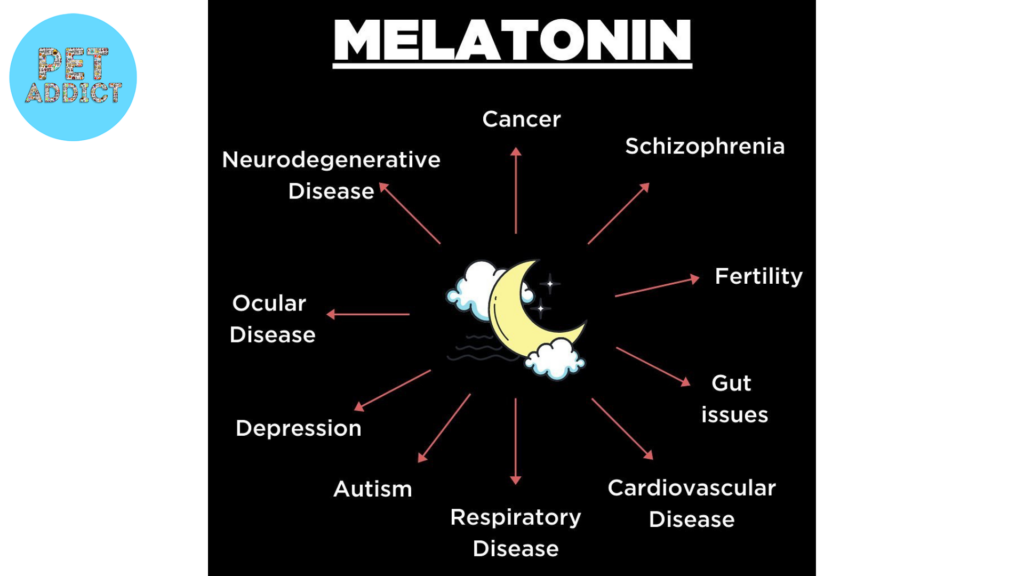As pet owners, we always strive to provide the best care for our furry companions, including their health and well-being. At times, we may encounter situations where our dogs experience anxiety, sleep disturbances, or phobias. During these moments, the question arises: can you give a dog melatonin? In this article, we will explore the use of melatonin for dogs, its potential benefits, safety considerations, and the importance of seeking professional advice.
PetAddict.net – The best place where you can find everything about your pet!
What is Melatonin?
Melatonin is a hormone produced naturally in both humans and dogs by the pineal gland in the brain. It plays a crucial role in regulating sleep-wake cycles and is often referred to as the “sleep hormone.” Melatonin levels rise in the evening, signaling to the body that it’s time to sleep, and decrease in the morning, helping us wake up refreshed.

Melatonin supplements for dogs are synthetic versions of this hormone, commonly available in the form of oral tablets or liquid. They are often used to address sleep-related issues and certain anxiety conditions in dogs.
Melatonin for Dogs: Is it Safe?
The safety of giving melatonin to dogs depends on various factors, including the dog’s age, health condition, and any medications they may be taking. While melatonin is generally considered safe for dogs in appropriate doses, there are potential side effects and risks that pet owners need to be aware of.

Common side effects of melatonin in dogs may include mild drowsiness, upset stomach, or changes in appetite. However, these side effects are usually mild and temporary. It’s essential to avoid giving melatonin to pregnant or lactating dogs, as well as those with specific medical conditions, without prior consultation with a veterinarian.
Common Uses of Melatonin for Dogs
Melatonin has a range of potential applications in veterinary medicine. One of the most common uses is for dogs with anxiety, particularly those with separation anxiety or noise phobias (e.g., fear of thunderstorms or fireworks). The calming effect of melatonin can help reduce anxiety-related behaviors and promote relaxation.

Additionally, melatonin may be used to address certain sleep disorders in dogs, such as insomnia or irregular sleep patterns. It can help regulate the sleep-wake cycle and improve overall sleep quality in some cases.
Administering Melatonin to Dogs
Administering melatonin to dogs should always be done under the guidance of a veterinarian. The appropriate dosage of melatonin depends on the dog’s weight and condition. Typically, the recommended dosage ranges from 1.5 to 6 milligrams per dog, given orally.

Pet owners should avoid using human melatonin products for dogs, as the dosage and formulations may not be suitable. Instead, specialized melatonin supplements designed for dogs should be used, ensuring the correct dosage and safety.
Consulting Your Veterinarian
Before giving melatonin to your dog, it is crucial to consult with a veterinarian. Veterinarians can conduct a thorough assessment of the dog’s health, medical history, and specific condition to determine if melatonin is an appropriate treatment option.

In cases of anxiety or behavioral issues, a veterinarian may recommend behavior modification techniques in conjunction with melatonin to address the root cause of the problem more effectively.
Natural Alternatives to Melatonin

While melatonin can be beneficial for some dogs, there are also natural remedies and lifestyle changes that pet owners can explore. These alternatives may include:
- Herbal Supplements: Certain herbs, such as chamomile, valerian root, or lavender, have calming properties that can help reduce anxiety in dogs.
- Behavioral Training: Positive reinforcement training techniques can be used to help dogs cope with anxiety and fear.
- Environmental Enrichment: Providing a stimulating and comforting environment can reduce stress and anxiety in dogs.
Precautions and Potential Interactions
As with any supplement or medication, there are precautions to consider when giving melatonin to dogs. Pet owners should be cautious when using melatonin alongside other medications, as there may be potential interactions. It is essential to inform the veterinarian about any other medications the dog is currently taking.
Melatonin may not be suitable for dogs with specific health conditions, such as liver or kidney disease. Pregnant or nursing dogs should not be given melatonin without consulting a veterinarian.
Conclusion
In conclusion, melatonin can be a potentially beneficial tool for addressing certain conditions in dogs, such as anxiety and sleep disturbances. However, it should be used with caution and under the guidance of a veterinarian. The safety and efficacy of melatonin can vary depending on the dog’s individual health and condition. To ensure the well-being of our beloved canine companions, seeking professional advice is crucial before using melatonin or any other supplement. By making informed decisions and working closely with veterinarians, pet owners can provide the best possible care for their dogs’ health and happiness.




